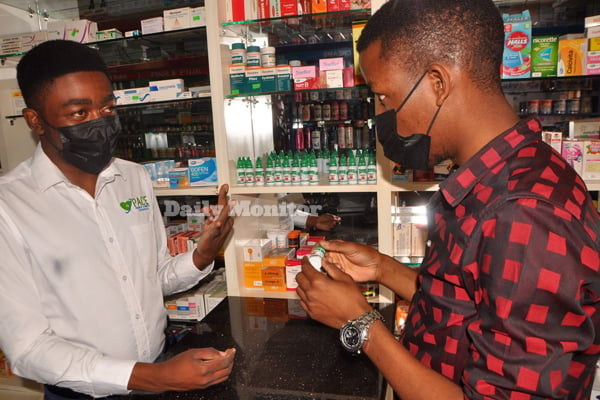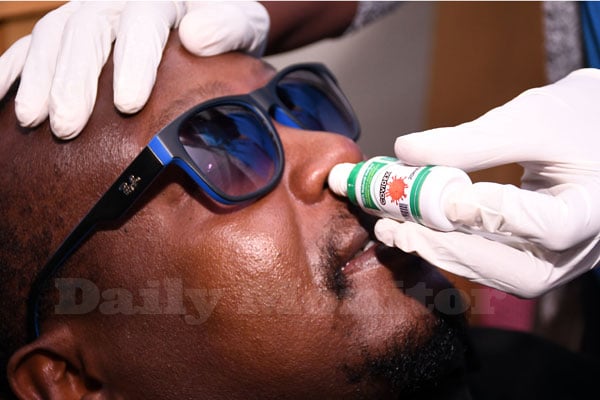Prime
Why NDA approved Covidex medicine

A customer buys Covidex from Pace Pharmacy in Ntinda, Kampala, recently after the National Drug Authority cleared it. PHOTO/STEPHEN OTAGE
What you need to know:
- “A friend of mine got me Covidex. The drops are uncomfortable and intrusive but after 20 minutes, the congestion cleared,” Tumushabe Sharon.
- “I was sceptical about this Covidex thing but it’s actually working for me and my family… You have to be very careful where you get it from. There are a lot of fake ones on the market,” Doreen Mbabazi.
- “Someone had flu but had tested negative for Covid. I gave him Covidex and he was fine within three days,” Hillary Bamulinde
The National Drug Authority (NDA) yesterday gave Ugandans a green light to use Covidex, a locally-made herbal medicine, as a supporting treatment for Covid-19 and other viral infections.
This approval comes two weeks after NDA directed the manufacturer of the medicine to stop the sale until the authority approves it, citing safety concerns. The move triggered widespread public debate.
Addressing journalists at Uganda Media Centre in Kampala yesterday, Dr David Nahamya, the secretary to the authority, said after 14 days of engagement with the innovators and assessing the product, they decided to approve it.
“NDA has granted Covidex an approval based on initial assessment, published literature and safety studies conducted by the innovator. The product has been formulated from herbal plants that have been traditionally used to alleviate symptoms of several diseases,” Dr Nahamya said.
However, he added that the medicine does not cure Covid-19 but it can supplement the medicine health workers use to treat patients.
“We have advised the manufacturers to conduct random controlled clinical trials, which are the highest level of evidence to ascertain any claims of treatment,” Dr Nahamya said.
He advised the public to only take the medication under guidance of a health personnel and report any side effects.
“We will continue to monitor the safety of Covidex through our post-market surveillance activities. We ask the public to immediately monitor any side effects of the product,’ Dr Nahamya said.
Although the announcement attracted appreciation from Ugandans, a section of the public think approving the medicine was rush, and that this could have a serious consequence on Covid-19 response.
Mr Nshakira Rukundo, a researcher at the Institute for Food and Resource Economics at the University of Bonn in Germany, said it was wrong for the authority to bow to pressure and approve the medicine.
“How a drug pending clinical trials which haven’t even begun is given authorisation for public use is beyond any sense of science and normalcy…. Here is what you [NDA] should have done: Stop the manufacturing of this medicine. Push the government to finance clinical trial independent of the manufacturers, conduct the study and wait for at least the first round of results,” he tweeted.
Mr Timothy Seryazi, another Ugandan, said: “The results of the clinical trials of Covidex should be more important at this moment than the monetary compensation. Our focus should be on the safety of the patients and not on the money.”
Mr Abiaz Rwamwiri, the head of communications at NDA, said the product has fulfilled the first step of approval, which applies to all herbal medicines.
“Product notification is the initial approval of drugs which we do for herbal medicines because of less [health] risk they pose. The product will become a registered drug in the country after completing clinical trials,” he said.
Dr Grace Nambatya, the head of Natural Chemotherapeutic Research Institute at the Ministry of Health, said a scientific rule, before clinical trials are done, one cannot claim that the product treats a disease.
Developer says
The developer agreed to drop the claim that his medicine is for Covid-19 treatment, according to NDA. Prof Patrick Ogwang, the developer, in June 14 statement said although his product has successfully completed laboratory tests for safety, it is yet to undergo clinical trials.
“Only a few people have used it so far to relieve symptoms. This, therefore, needs more proof that it works against Covid-19. Clinical trials prove a medicine is effective [against Covid-19],” he said.
Covidex developer, Prof Patrick Ogwang, full statement:

Covidex developer, Prof Patrick Ogwang
“I write to inform the public that Covidex, a formula developed by me, has undergone only laboratory tests by me and my team of scientists at Mbarara University of Science and Tecnology (MUST) for active compounds and safety in laboratory animals. Only a few people have used it so far to relieve their symptoms of Covid-19. This, therefore, needs more proof that it works against Covid-19.
Clinical trials that prove a medicine that a medicine is effective [against a disease] has not yet been done due to funding limitations but the President of Uganda Yoweri Museveni talked to me and [has] given me all the support we need to do more work on Covidex. I have linked up with the Pharmaceutical Society of Uganda and other scientists in MUST to carry out clinical trials so that we may know whether it is beneficial or not. I met with the NDA and agreed that no treatment claims be made on the product until the clinical trials results are obtained. NDA also advised me to change the product name to avoid using a word related [to] Covid and I have taken their advice positively.”
WHO reaction to approval of Covidex
Is the WHO in agreement?
From the statement released by NDA-Uganda, it is clear that the product is not approved as Covid-19 therapeutic. As of today, no ethiotropic treatment for Covid-19 has demonstrated safety and efficacy through robust clinical trials with results been peer reviewed. A number of clinical trials are underway to investigate candidate products including from traditional medicine in the African region.
On May 4, WHO issued a statement: “WHO supports scientifically proven - traditional medicine”, in line with Research and Development as one of the priority interventions of the Regional Strategy on Traditional Medicine: https://www.afro.who.int/news/who-supports-scientifically-proven-traditional-medicine
Does the WHO know it’s formulation and is it safe for public use?
WHO didn’t yet receive any information about this product. The research streams presented by the researchers during the regional consultation on traditional medicine and Covid-19, which took place from 30 March to April 1, summarised below:
•Preclinical safety and efficacy studies on traditional medicines were being conducted in nine countries: Benin, Botswana, Cameroon, Congo (Republic), Gabon, Ghana, Kenya, Nigeria and South Africa.
•Phase I clinical trials on traditional medicines were being conducted in five countries: Central African Republic, Cameroon, Ethiopia, Nigeria, South Africa.
•Phase II clinical trials on traditional medicines were being conducted in seven countries: Burkina Faso, Democratic Republic of Congo, Ghana, Guinea, Nigeria, Uganda and Togo.
•Phase III clinical trials on traditional medicines were being conducted in two countries: Equatorial Guinea and Madagascar
•Clinical observational studies on traditional medicines were being conducted in three countries: Benin, Burkina Faso and Congo (Republic).
Will the WHO come out to support the clinical trials that are yet to be done to provide evidence of its efficacy? WHO is very keen to assist Uganda conducting Research & Development on traditional medicine including clinical trials for COVID-19 candidate vaccines and therapeutics. WHO in collaboration with Africa Centre for Disease Control and Prevention (Africa CDC) has developed master and generic protocols to provide guidance to Member States for developing clinical trial protocols to assess products claimed to treat Covid-19.
WHO and Africa CDC also launched the Regional Expert Advisory Committee on Traditional Medicine for COVID-19 on 22nd July 2020 with the aim of elevating the standards of clinical trials of traditional medicines for Covid-19 through pooling expertise for multi-centre studies and creating the conditions for consolidated data across the African region.




